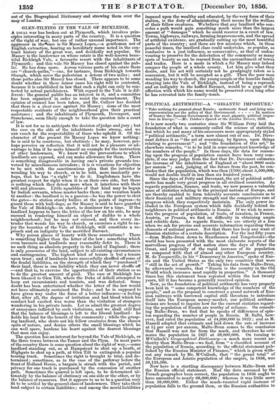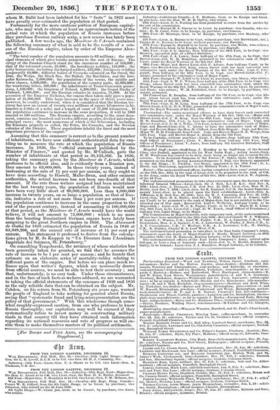POLITICAL ARITHMETIC—A "GIGANTIC IMPOSTURE.'
"Take nothing for granted about Russia systematic fraud and lying mis- representation are the policy of that Government. In matters of finance the Russian Government is the most gigantic political impos- ture in Europe."—Mr. Cobden's Speeds at the _London Tavern, 1850.
IT is now nearly two centuries since Sir William Petty laid the foundation of what is commonly called the science of statistics, but which he and many of his successors more appropriately styled "political arithmetic a term now almost out of use. Dr. Dave- nant defines it as "the art of reasoning., by figures, upon things relating to government" ; and "the foundation of this art," he elsewhere remarks, "is to be laid in some competent knowledge of the numbers of the people." In those days, the data for reason- ing upon the progress of population cannot have been very com- plete, if one may judge from the fact that Dr. Davenant estimates• the increase of the inhabitants of England. at "about 9000 souls per annum"; and, judging of the future from the past, he con- cludes that the population, which was then (1700) about 5,500,000, would not double itself in less than six hundred years.
Since the days of Petty and. Davenant, the art of political arith- metic has made very great progress in all civilized countries. As regards population, finance, and trade, we now possess a valuable mass of statistics relating to the principal nations of Europe, and are thereby enabled to form tolerably accurate conclusions as to their financial and military strength and the comparative rate of progress which they respectively maintain. The only power in- cluded in the European system which falls decidedly behind its neighbours in political arithmetic is Russia. If we wish to ascer- tain the progress of population, of trade, of taxation, in France, Austria, or Prussia, we find no difficulty in obtaining ample and reliable data. As regards Russia we are utterly at a loss when we ask for precise and accurate information regarding those elements of national power. Not that there has been any want of Russian statistics of a certain description. For the last fifty years —from Malte-Brun down to Haxthausen and Tengoborski—the world has been presented with the most elaborate reports of the marvellous progress of that nation since the days of Peter the Great, and especially of the rapid increase of its population as compared with that of almost any other European country. M. de Tocqueville, in his "Democracy in America," spoke of Rus- sia and the United States as the only two countries that were "still in the act of growth." Taking his data from Malte-Brun, he afterwards remarks, that "Russia is the country in the Old World which increases most rapidly in proportion. A thousand times has this statement been repeated. within the last twenty years, till it has become a generally received opinion.
Now, as the foundation of political arithmetic has very properly been laid in "some competent knowledge of the numbers of the people," and as the proposal to construct a grand network of Rus- sian railways with borrowed capital still threatens to introduce itself into the European money-market, our political arithme- ticians are bound to inquire how far the current statistics regard- ing the population of Russia are worthy of reliance. On consult- ing Malte-Brun we find that he speaks of differences of opin- ion regarding the number of people in Russia. M. Balbi, how- ever, had rated the population at 54,000,000 in 1822; and as M. Hassell adopted that estimate and laid down the rate of increase at 11 per cent per annum' Malte-Brun comes to the conclusion that Hassell was not far from the mark, and therefore he esti- mates the population in 1827 at 59,000,000. On turning to M'Culloch's Geographical Dictionary—a much more recent au- thority than Malte-Brun—we find, from" a classified account of the population of Russia, according to the official statement pub- lished by the Russian Minister of Finance," which is given with- out any remark by Mr. /Mulled', that "the grand total" of the European and Asiatic population of the empire, in 1836, was 59,133,566. Now here is a startling discrepancy between Malte-Brun and the Russian official statement. Had the data assumed by the French geographer been correct, the population in 1836 ought to have amounted to nearly 68,000,000; whereas it was little more than 59,000,000. Either the much-vaunted rapid increase of population falls to the ground then, or the Russian authorities to whom M. BOA had been indebted for his " facts " in 1822 must have greatly over-estimated the population at that period. Fortunately for the more cautious' paiition of Etrropean capital- ists, who may wish to obtain at least an approximate notion of the actual rate at which the population of Russia increases before they purchase Russian railway scrip, a new census has lately been published. I few weeks ago, the Moniteur de Armee contained the following summary of what is said to be the results of a cen- sus of the Russian empire, taken by order of the Emperor Alen- ander— " The total number of the population amounts to 63 millions ; the prin- cipal elements of which give results unknown to the rest of -Europe. The clergy of the Russian Church stand for the enormous number of 510,000; that of the tolerated creeds, &5,000; the hereditary nobility„.155,000 ; the petty bourgeoisie, including discharged soldiers, 42,5,000 ; foreigners residing tenipomrilv40,0150 ; different bodies of Cossacks colonized on the Oural, the Don the olg,a, the Black Sea, the Baikal, the Baschkirs, and the irre- gular Kahuucks, 2,000,000- the population of the towns the middle and lower classes, 5,000,000; the population of the country Parts, 45,000,000; the wandering tribes, 500,000; the inhabitants of Trans-Caucasian posses- sions, 1,460,000 ; the kingdom of Poland. 4,200,000; the Grand Duchy of Finland, 1,400,000; and the Russian colonies in America, 71,000. At the accession of the Emperor Nicholas, the'census then taken only gave a popu- lation of 51,000,000. This large increase in the space of thirty years may, however, be readily understood, when it is considered that the Russian ter- ritory ha h now an extent of tweatytwdmillionsof square kilometres (a ki- lometre is 5-8ths of a mile) and a length of coast; of 27,000 kilometres. If the population continues to increase in the same proportion, it will by 1900 amount to 100 millions. The Russian empire, according to the same docu- ment, contains one hundred and twelve different peoples, divided into twelve principal races ; the most numerous of which is the Sclavonian, including the Russians properly so called, the Poles, the Cossacks, and the Servian colonies of the Dnieper. These populations inhabit the finest and the most important provinces of the empire.' - Assuming that this summary is correct as to the present number of inhabitants, we have now sufficient authenticated data for ena- bling us to measure the rate at which the population of 'Russia increases. In 1836, the "official statement published by the Minister of Finance," and quoted by Mr. M'Cullooh, gave the number of inhabitants at that period as 59,133,566. In 1856, taking the summary given by the Moniteur de 1' Armee, which professes to be official also, and is evidently from a Russian pen, they amount to 63,000,000. In those twenty years, instead of increasing at the rate of 11 per cent per annum, as they ought to have done according to Hassell, Malte-Brun, and other eminent authorities, the actual increase has not been one-fourth of that amount. If the rate those writers assigned had been maintained for the last twenty- years, the population of Russia would now have been very little short of 80,000,000. Less than 4,000,000 increase in twenty years, on so large a population as that of Rus- sia, indicates a rate of not more than -k per cent per annum. If the population continues to increase in the same proportion to the end of the present century, instead of amounting to 100,000,000 at that period, as the Moniteur de I 'Arm& would have the world believe, it will not amount to 72,000,000; which is no more than the boasting Russianized German organs have lately been assigning to the great Northern empire in 1856. The Almanach de Gotha for 1848 estimated the population of Russia in 1846 at 65,949,266, and the annual rate of increase at 11- per cent per annual. This statement it professed to derive from the calcula- tions given by M. de liceppen in " •Discours dans l'Academie Imperiale des Sciences, St. Petersbourg." On consulting Tengoborski, the accuracy of whose statistics has been generally taken for granted, we find that he assumes the rate of increase to be 1 per cent per annum ; and he founds that estimate on an elaborate series of mortality-tables relating to different parts of the empire. But before we can place. much re- liance upon that writer's figures, which are necessarily drawn from official sources, we must be able to test their accuracy and that, unfortunately, is no easy task. Under these circumstances,
i
and n the face of such facts as we have adduced, we are warranted in taking the official statements of the censuses of 1836 and 1856 as the only reliable data that can be obtained on the subject. Mr. Cobden, on his return from St. Petersburg six years ago, warned the people of England to take nothing for granted about Russia, seeing that "systematic fraud and lying misrepresentation are the policy of that government." With this wholesome though some- what roughly-expressed caution, from one who professes to know Russia thoroughly, our capitalists may well be excused if they systematically refuse to invest money in constructing military roads in that country till they have obtained such information regarding its national resources and rate of progress as will en- able them to make themselves masters of its political azithraetic.

































 Previous page
Previous page